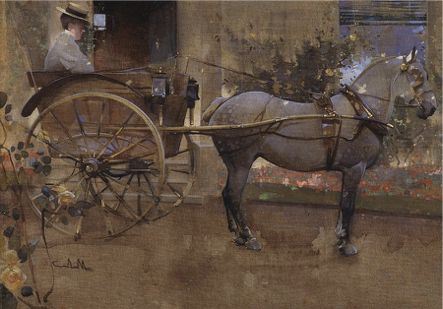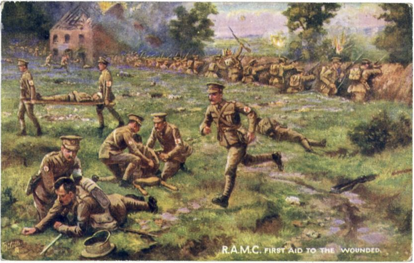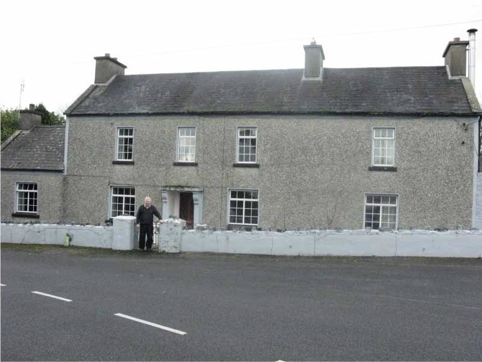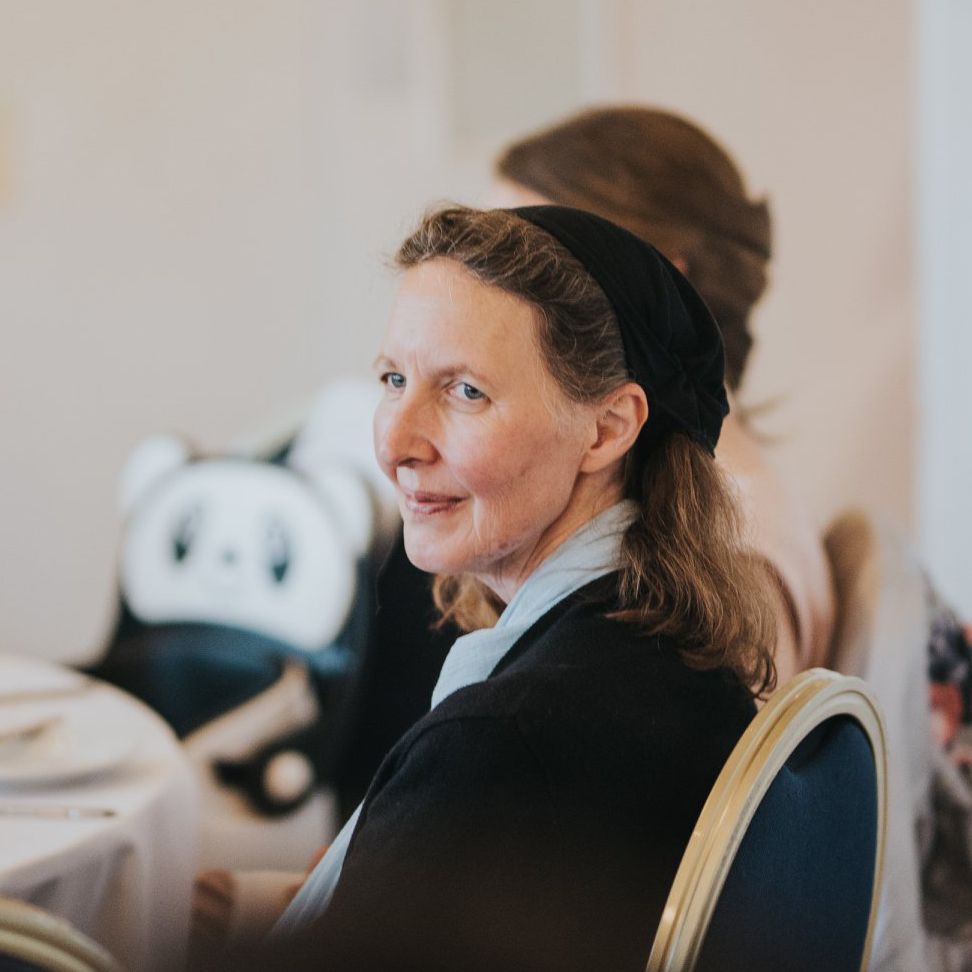5th July - No letter
Secret diary: July 5th Mon To Brennans Brennan 'old Mr Brennan' 5 in governess cart Family 12. 2 in army.
Official diary (5th July): I moved to old Mr Brennan’s house. He is 72 years of age and has a wife and family of 12, two sons served in the R.A.M.C. during the war, two other sons and two daughters were at home when I was there. This house is about 3 or 4 miles North West of BUNRATTY HOUSE. I stayed here on the 6th and 7th.
Location: Brennan’s of Clonmoney

Brennan was probably well-known to the authorities as an IRA sympathiser, and this was probably why CHTL didn't hesitate to name him. He was also a relatively old man at 72 so wouldn't be actively involved in raids. In his favour was the fact that two of his sons had served in the R.A.M.C. - The Royal Army Medical Corps. These were the men who risked their lives gathering up and tending the wounded on the battle fields:
"I kneel behind the soldier's trench,
The Red Cross Spirit Speaks - John Finley
I walk 'mid shambles, smear and stench,
The dead I mourn,
I bear the stretcher and I bend
O'er Fritz and Pierre and Jack to mend,
What shells have torn"

CHTL made a point of mentioning this as he had great admiration for the work of the medical corps. Three of his sisters (Peggy, Dina and Cecil) had been nurses serving on the frontline. CHTL himself had picked up First Aid techniques, as shown by his tending to Danford after he was shot and offering to put a stitch in a wound one of the IRA volunteers had. Brennan’s sons being in the medical corps was a mitigating fact, not a point for the prosecution.
Old Mr Brennan, John Brennan, was registered in the 1911 census as being 62 which would have made him 71-72 in 1920. In 1911 he had three sons and a daughter living at home with him and his 51 year old wife Annie: Michael (29) a Commission Agent, James (26) and Joseph (23) who along with their parents were listed as farmers and sister Margaret who was 21. They all lived at no. 1 West Clonmoney, known as ’Ivy Cottage’ in County Clare.
Brennan descendants still live in the same house and recall stories of ’the general’ playing cards with their relatives. According to his son, John, James Brennan was ’the only one of the people who were minding him who was able to play bridge and so spent many hours keeping the General happy. It is very interesting that CHTL doesn’t name James in his report. Later on James appeared, along with CHTL, in the ’proof of capture’ photo.
John Brennan, Dúchas na Sionna archive - Shannon Social History Project. Interview recorded on 3/2/2012

Having been detained for over a week, CHTL was already becoming something of a burden to those who held him. He was such a huge drain on resources, requiring a large number of men to take turns in guarding him. Also there was the added trouble of finding him accommodation, providing for his needs and keeping him entertained. However CHTL wasn't someone that the Irish lads could dislike even though they probably wanted to. It must have been fascinating for the boys to meet face to face such a high-ranking officer and one who was from 'the other side'. Some of them may have never come that close to their own leaders or been able to have had a conversation with them. CHTL was the enemy - he represented the imperialistic foreign force that they were fighting.
As Churchill, Sir Henry Wilson and others on the opposite side knew, it actually doesn't help to like your enemy to keep the momentum of the battle going.
However something special happened as the humanity of this group of men broke through, they didn't abandon their sides, they stayed true to their opposing causes, but by displaying virtues such as kindness, respect and honour and above all humour they gave hope for the future of the two nations: with differences put aside, men and women could sit down together and enjoy lively banter and simple pleasures.
Playing cards with the general in the evenings brightened the Volunteer’s days and kept them entertained. CHTL was a headache for those in charge, but the lads who guarded him enjoyed having a break from the more dangerous raids they would have been on if their hands weren’t tied up minding the general.
Cultured IRA supporters were drafted in to converse with CHTL and no doubt there was some lively debate: ‘Joe Moylan and other educated young men were called in to provide conversation and company.’ (p53 Sean Moylan: Rebel Leader, Aideen Carroll, Mercier)
Tomas O Maoileoin described the positives and negatives of holding the British General:
Lucas was a very decent man and could even see our point of view. He said to me once that if he were an Irishman he would be in the I.R.A. He was a very keen card player, very fond of bridge, and we, of course, tried to make everything as pleasant as we could for him. He was a bit of a nuisance while he was around, our attention being concentrated on baling after him. He held up the whole place. Nobody could do anything while he was with us. We did, of course, what North Cork did - passed him along to somebody else. We got in touch with Clare and suggested that it was getting too dangerous to keep him in East Limerick. There had been raids here and there. We took him across to Clare side in a boat and handed him over there to Mick. Brennan and company. We remained for some time in Clare with Lucas.
I was wounded in Clare actually that time. I ran into a military patrol. This was the time that Lucas was down there, it was after we had handed him over to Brennan. We were just coming along the road and we saw this lorry coming. We took to the fields, and a lucky shot got me in the thigh. It was not very serious. I was taken into hospital at Limerick afterwards. Lucas was kept in Clare for a while.
BUREAU OF MILITARY HISTORY, 1913-21. STATEMENT BY WITNESS DOCUMENT NO W.S. 845 Tomas O Maoileoin, Vice-Comd't. East Limerick Brigade; Second i/c. East Limerick Flying Column.
One of Collin’s best officers in County Limerick, Tomas’ O’Maoileoin (Thomas Malone) - alias Sean Forde- narrowly escaped death while in the custody of Auxiliaries in Cork City. O’Maoileoin was the younger brother of Seamus O’Maoileoin , an IRA intelligence officer in Limerick. Tomas’ was among the few Irish Volunteers who participated in the 1916 Easter Rising outside of Dublin and after confinement in Frongach, he returned to Limerick and helped organise the IRA East Limerick Brigade. He was one of the most active IRA officers during the conflict, rising to become Vice Commandant of the Brigade and participating in some of the most celebrated attacks on RIC barracks and firefights with British regulars. In the spring 1920 he was wounded during an attack in East Clare.
Michael Collins and the Anglo-Irish War: Britain's Counterinsurgency Failure By J. B. E. Hittle
Meanwhile, in the world outside, many people in Ireland were loving the story of the captured general and making the most of the opportunity to have some fun with the British:
Military Hoaxed
The military authorities at Mulling were the victims of a sensational hoax yesterday. A fete and bazar was held at Rochfort Bridge, nine miles from the town, and an announcement appeared that the captured General Lucas would be exhibited. A large force of military were dispatched, and aeroplanes from the Curragh hovered over, but it was only a local mock representation of the general.
Derby Daily Telegraph 5th July 1920
Questions in Parliament
In the House of Parliament, the opposition were making the most of the government’s embarrassment caused by the IRA snatching one of their generals so easily and being able to hide him away for nine days in spite of all the thousands of troops and resources which had been involved in the search.
It was not just the IRA who were chuckling at the Liberal government's discomfort.
The entries from Wilson’s diaries, describing Churchill purple with rage at CHTL tie in very nicely with the humiliation Churchill suffered in the Commons on the 5th:
Mr. SWAN asked the Secretary of State for War: how many generals are missing from Irish commands?
Mr. CHURCHILL: One.
Mr. SWAN asked the Secretary of State for War: whether a letter has been received from General Lucas stating that he is being well treated, and deprecating the rioting indulged in by the troops at Fermoy; and what action is being taken against the troops and their officers?
Mr. CHURCHILL: The facts are, broadly speaking, as stated in the question, but we have, of course, no means of knowing the circumstances under which the letter was written. As regards the latter part of the question, the matter is at present being investigated by the military authorities.
HC Deb 05 July 1920 vol 131 c1035W
The letter that Churchill mentioned was a letter sent to an unnamed officer at Fermoy barracks.
The recipient confirmed that the letter was 'undoubtedly in the General's handwriting, but it disclosed no hint of his whereabouts'. Its content was released to the press on the following Wednesday, although the authorities by that time had had several days to weigh up the significance of its contents. The letter, according to two newspaper reports, was as follows:
I am being well and considerately treated. Letters will be delivered to me after being censored provided they are done up in a parcel and delivered at _______ in Fermoy. If you try to follow up the letters they will not be delivered. You will not, I am afraid, get anything out of it, and I will not get the letters. I have nothing to complain of as to the consideration shown me. They are doing all they possibly can to provide me with everything I want. I want some money - about £10. I am very glad to know that Colonel Danford is not dead, because I thought he was dead when he left me. He and I tried to escape and we attacked the guard. Colonel Danford was shot while struggling with a man. I have nothing else to add, and I understand my detention will last some weeks.
Newspaper cuttings found amongst CHTL's papers
Swan, being a member of the Labour Party, was quite happy to believe CHTL's letter as his party had sympathy with the Irish cause. But Churchill was very reluctant to accept the letter as a true statement. As is so often the case, Paul McMahon writes:
Policy makers make decisions not on the basis of objective analysis of the facts, but by employing subjective cognitive premises and belief systems. They see what they want to see, select information that fits their pre-existing hypotheses and biases and ignore what is inconvenient. Prejudices and assumptions distorted the British government’s understanding of many other countries…Preconceptions were especially important in relation to Irish Affairs. Ireland was so closely connected to Britain, and had been an emotive political issue for so long, that most British leaders had strong opinions on its people, its problems and the right solutions.
P162 ‘British Spies and Irish Rebels: British Intelligence and Ireland, 1916-1945' Paul McMahon, Boydell Press, 19 Jun 2008
Churchill did not want to know that CHTL's captors were looking after him well. This did not fit with the 'politically correct' and commonly held description of all IRA men being evil criminals and cold-blooded murderers that the government needed to portray. He had also already decided his policy:
The question is not whether General Lucas’ life will be jeopardised by the drive taking place, but whether Government policy should be influenced by such a consideration. On this point, however painful, no alternative course is possible.
1.7.20 (Churchill Archives CHAR 16/52A)
Hearing that Lucas was being well-treated, wasn’t helpful. To continue with the ‘drive’ it would have been better to hear that he was being badly treated.
To be fair there were terrible atrocities carried out by both sides of the conflict, but the CHTL situation made the point that there were also decent and kind men and women on both sides. Churchill struggled with stepping back and objectively analysing the information presented before him in Lucas' letter. He didn't want to see this side of his 'enemies', so therefore CHTL must have written the letter under duress - it couldn't possibly be true as it didn't fit with the prejudices and assumptions that many of those in power in Britain held.
A few months later in America there was a commission held to look into the ‘Conditions in Ireland’. There were three ex RIC constables who gave testimony, all from Clogheen which was in CHTL’s area of command. There were only 5 constables in Clogheen at the time. One of them 23 year old Daniel Crowley gave a muddled allegation that General Lucas ordered that Sinn Fein suspects should be lined up and machine gunned and their properties set on fire. Neither of the other two Clogheen constables backed up his story, although all three ex RIC officers gave testimony to the threatening behaviour of the Black and Tans stationed alongside them. This isolated allegation does not stand up for several reasons:
- One of the strongest reasons why the truth of the allegation is in doubt is that the IRA had the most incredible spy network. If there was any hint of Lucas giving those orders then he would have been shot as was Colonel Smyth (on 18th July).
- Secondly if CHTL had given those orders, why would he have been so relaxed and confident that he would be released? He would have known about the assassination of Smyth and realised that his captors wouldn’t hesitate to punish him similarly.
- Also none of the IRA Witness Statements repeat this allegation. If it was true it would have been known by the time that the statements were collected. In fact there are no other records anywhere of this ever happening.
- Neither of the other two Clogheen ex constables were willing to back these allegations up. Presumably they would have been present at the time the ‘orders’ were given and been equally shocked by them.
- Most importantly the allegation doesn’t ring true when held against the character and military record of Brig. General Lucas. He was appalled at the way the German army behaved in Flanders and Belgium, seeing first hand the destruction of Louvain. He was a disciplined soldier of the old school and came from a family of sincere compassionate Christians, former Quakers, who would have been horrified at such behaviour.
- Finally there are no records of machine-gunning and burning of property ever happening in the Clogheen area whilst CHTL was in charge. Crowley said that was because the ‘people were so quiet’ at that time. If the people were behaving themselves, why would such a harsh measure be needed? Why would sleepy Clogheen be chosen and not anywhere else where there were more problems such as around Fermoy? Later on there was a lot more IRA activity around Clogheen and suspects were shot, but that was a long time after General Lucas had left.
Daniel Crowley was young and had fled Ireland because on one hand he was being threatened by the Black and Tans and on the other hand the IRA saw Irish RIC officers as traitors and deserving of instant execution. One can’t really blame him trying to please the more extreme members of the Commission by giving them a story which countered the unhelpful ‘nice chap’ report of the British general. Crowley must have been desperate to start a new life in safety.
As some of those in power in Britain did not want to believe that the IRA could be kind and humane because it didn’t fit with their preconceived images of their ‘enemy’, similarly in America some in the Commission were only too willing to believe a flaky report, about a British general ordering the machine gunning of Irish citizens, because that did fit with their prejudices and assumptions about the ‘Imperialist oppressors’. The story of a British general being liked by the IRA was just not helpful to the cause as they saw it. One has to maintain that one is fighting 'evil'. Your enemy can't have good qualities if you have any hope of maintaining the fight. He can't be 'a likeable chap'!
Of course as the War of Independence progressed there were many examples of both sides living up to the worst stereo types, but in the capture of General Lucas, in this moment of time in this particular situation, the ‘evil’ was superseded for a short period by ‘kindness’.

